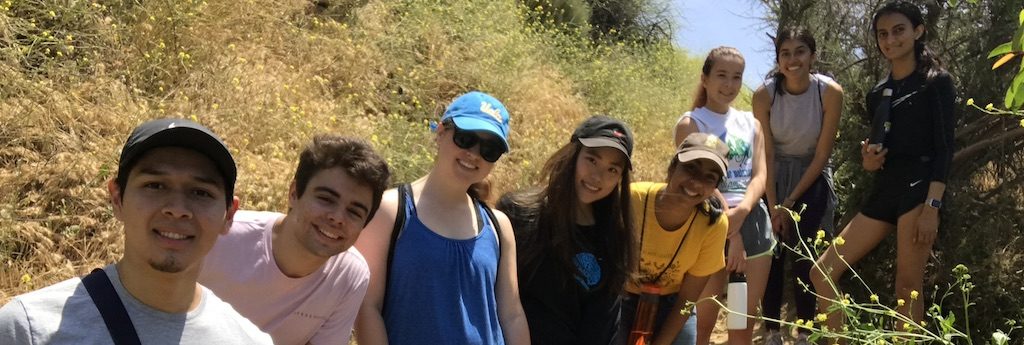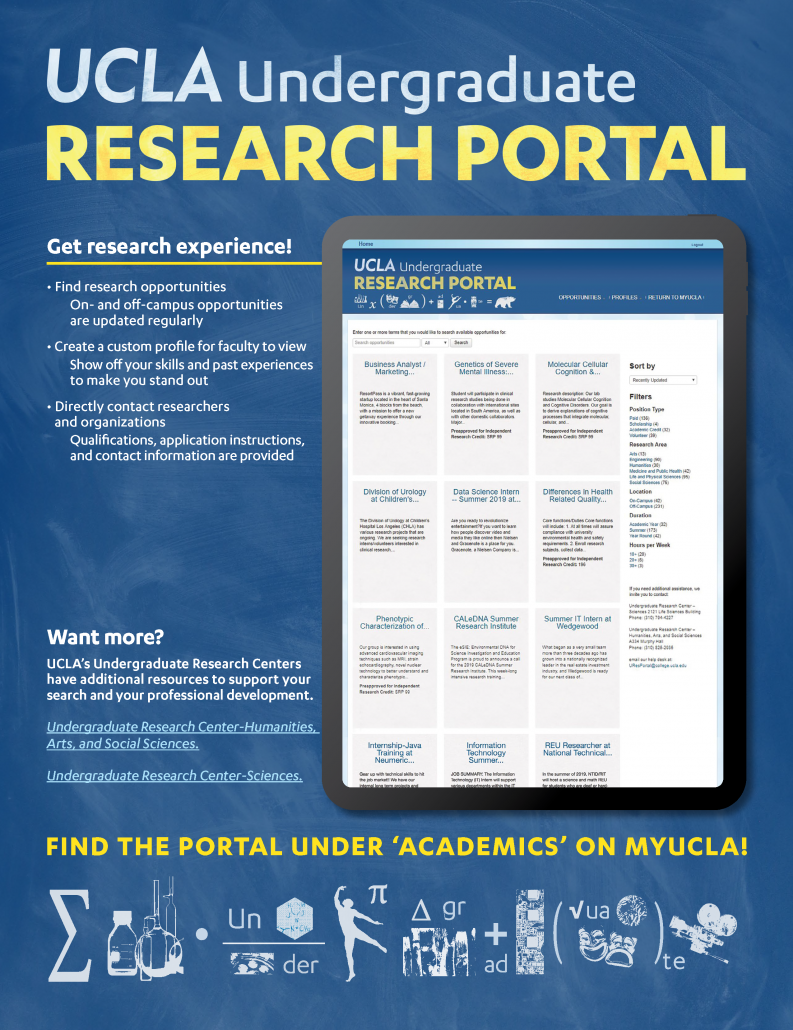Research

Greetings Neuroscience Bruins,
As we continue into another quarter of remote learning, we want to assure students in the Neuroscience program that they can pursue SRP-99 and NEUROSC 199ABC/198AB research contracts this fall quarter. If you need help coming up with ideas of how to fulfill your research contract this quarter, please consult with your faculty mentor. You can also reference the list of remote project activity recommendations (link below) that has been provided by the Undergraduate Research Center- Life Sciences, along with the list below that was recently shared with our Neuroscience research mentors.
Suggestions for Remote Activities:
- Focus on analyzing data previously collected. Re-analysis provides an opportunity for a second impartial/blind look at the lab’s data and can highlight strong inter-rater reliability values that can strengthen grant applications and manuscripts.
- Conduct a literature review relevant to the lab’s work.
- Help craft rebuttals to reviews of previously submitted manuscripts and applications.
- Take a deep dive into planning what experiments to prioritize once students are allowed back in lab.
- Develop an infographic for the public on your lab’s research topic and consider posting on the lab website.
- Enroll in on-line classes for coding through the Collaboratory at https://qcb.ucla.edu/collaboratory-2/workshops/ — develop lab-relevant code in your exercises.
- Use your social media expertise to systematically promote the lab’s accomplishments.
- Critique and edit the lab’s publications, posters or grant applications.
- Shift to a modeling project that can be supervised remotely.
- In addition, taking the EH&S lab safety fundamentals course, filling out MHQs, taking the relevant on-line Citi quiz, attending and making presentations (e.g. of new analyses or presenting a relevant publication) at Zoom lab meetings all count towards time spent engaging in research
Students pursuing 199ABC/198AB research contracts this quarter can find all of the required forms and information on the Neuroscience website, along with the link to the CCLE website where these materials must be uploaded by Friday of Week 1.
Thank you all for your flexibility during these unprecedented circumstances and please let us know if you or your faculty mentor have questions.
Thank you,
Dr. Stephanie White, Dr. Christopher Colwell, Jaclyn Robbin & Aftin Whitten
How to Get into Research: Tips for Finding A Faculty Mentor
- In your first year, get in the habit of going to office hours. Introduce yourself to the professor, ask questions about the course material, or maybe about the professor’s own research. Keep doing this throughout the next four years. This will make you known to your professors, and get you in the habit of asking questions and participating in your own education. Start thinking about volunteering in a laboratory or in a hospital. It is not recommended to do volunteering in your first year, as you are still getting adjusted to the academic rigor of UCLA, but summer after your first year is a good time to start some volunteering experience. If you start early, you will be doing more résumé-worthy work by the time you apply to graduate or professional school.
- In your second year, start working on choosing a professor with whom to start an SRP project. Keep in mind that your faculty sponsor must have an Academic Senate title (Assistant Professor, Associate Professor or Professor) and is doing research related to the brain if you want to go on to a Neuroscience 199A/198A contract.
- Please note that if you plan to complete the neuroscience major capstone through the independent research contracts, the research that you are working on must be directly related to the field of neuroscience. You can learn more about the capstone requirements here: https://www.neurosci.ucla.edu/program/major-capstone/
Research Resources
- Undergraduate Research Center
- (SRP 99) When you log-on to your MyUCLA, you can view open positions on the Undergraduate Research Portal. This includes postings with current lab openings. You can complete SRP 99 research under a different department (i.e. Psychology, Psychiatry). When you apply for the Neuroscience 199A course, we will check to make sure it’s the same faculty sponsor.
- Neuroscience PhD Faculty List
- This site also has faculty broken down into various areas of interest: brain imaging, developmental Neuroscience, learning and memory, neural repair and neural degeneration, and more.
- Brain Research Institute Members
- You can use the UCLA Directory to verify their titles. The titles will be abbreviated: Assoc Prof, Asst Prof, and Prof. If you see the words “In Res,” that is acceptable. “Adj” signifies Adjunct, and you will not be approved to do research with this person.
- Undergraduate Research Portal in Computational Biosciences
- This portal was designed to connect UCLA faculty and UCLA undergraduates around biosciences research projects that involve data analysis or modeling.
Narrow down your choices to perhaps five professors. Then go to the Biomedical Library and look up two or three recent publications of each professor. Read them to see if they interest you. A few weeks before the quarter in which you’d like to begin your SRP, send letters or emails to three to five of the professors you researched. The letter should introduce yourself, mention particular publications of that professor you found interesting, and include a resume and transcript or Degree Audit. Mention in the cover letter that you will be calling in a few days to discuss your possible participation in the laboratory as an SRP student. Then call the potential sponsors and set up appointments to see them. Be sure to mention that you are eventually hoping to complete two quarters of upper division research with them as part of your Neuroscience major.
In your junior and senior years, you can start your major capstone with NEUROSC 199A (or NEUROSC 198A for Departmental Honors students). If you are a transfer student, see the procedures above to begin volunteer work and to choose a sponsor for your research. One quarter of SRP-99 or departmental 199 in the lab and NEUROSC M101A are enforced prerequisites for both NEUROSC 198A and 199A. Students choosing to complete research for Neuroscience major credit must do two quarters of upper division research in the same lab. Instructions for enrolling in research and capstone contracts can be found on the Major Capstone page.

